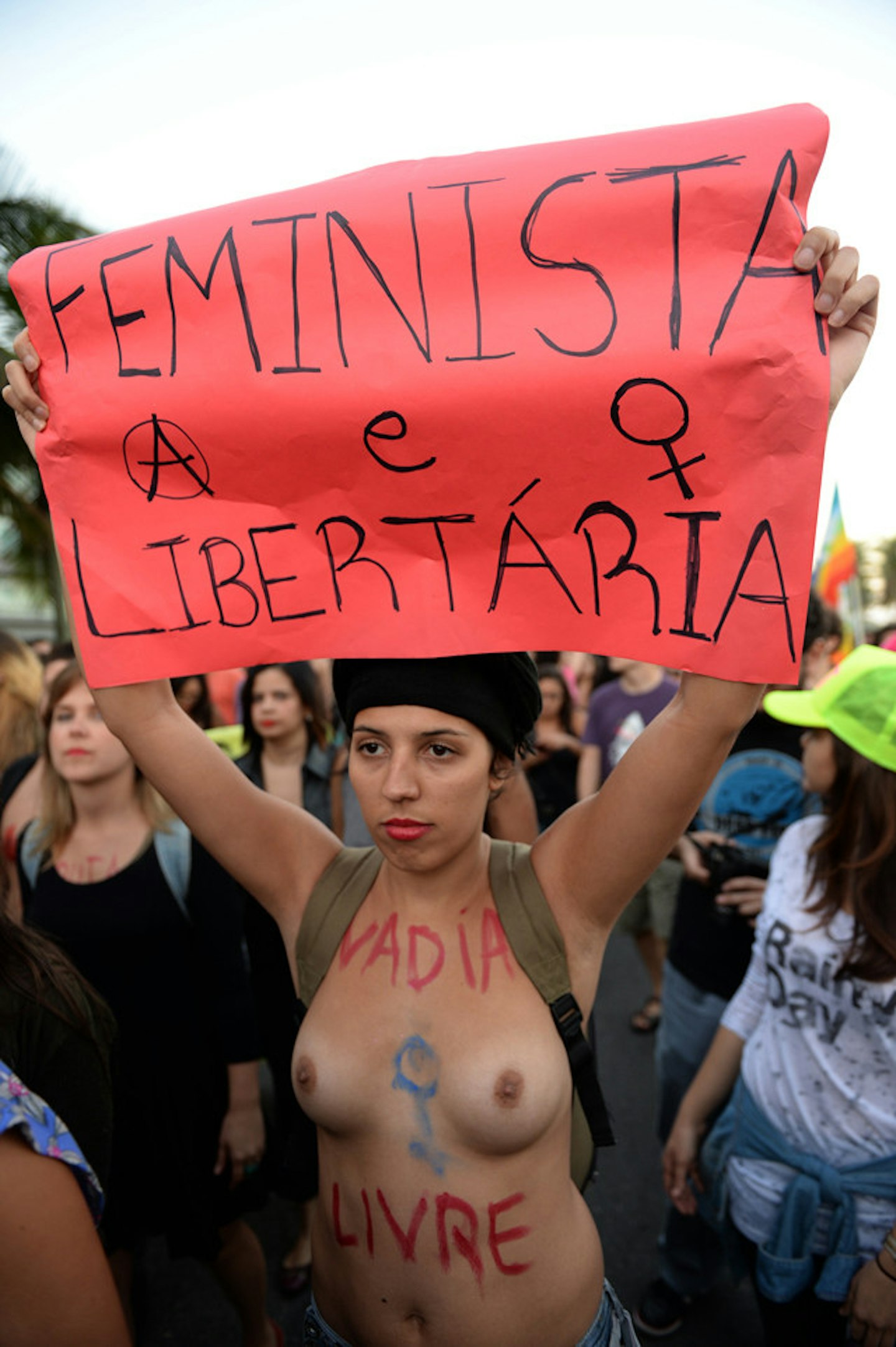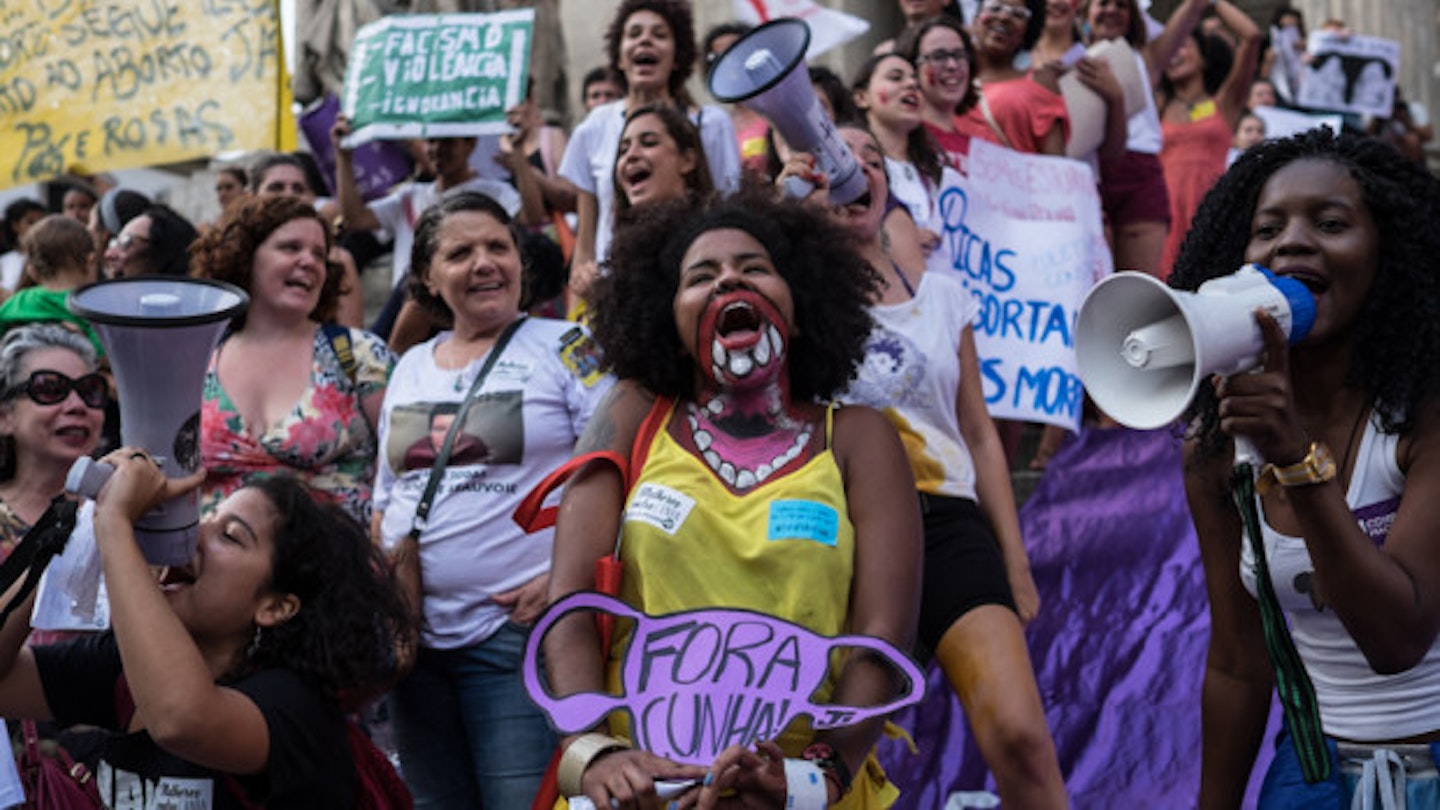There’s a news report on the BBC News at Ten, the presenter is following a young Brazilian woman, who's wearing a lab coat, around Rio de Janero in a van. One of the van’s windows is specially adapted with a giant funnel, the young women is methodically opening jars of mosquitos, placing them in the funnel, shaking them until the insects fly away and then, systematically, placing the lid back on the empty jar, picking up another one and doing it all again.
It’s another report about the Zika virus crisis which has affected many countries in South America. They are releasing genetically modified mosquitos in an attempt to reduce the wild insect population.
Behind the headlines, in Brazil, the Zika virus crisis in Brazil has opened an old wound and reignited major debate on a delicate subject: that is, a woman’s right to choose.
Abortion and abortion law are very sensitive subjects in Brazil, it’s illegal except in three very extreme and restrictive cases: when a woman’s life is in danger, rape (which is very common) and anencephaly. Indeed, in December last year politicians, lead by Eduardo Cunha, the speaker of Brazil’s lower house of congress, were proposing a law which would force women who reported becoming pregnant after a sexual assault to undergo forensic and psychological examinations if they were seeking an abortion. Thousands of women took to the streets in protest.
In Brazil religion has historically dominated the abortion debate. It has always been seen as a ‘mortal sin’, like murder, and is a crime against life according to the country’s 1940 Penal Code.
Erika, who is 27 and grew up in Rio, told The Debrief ‘it’s a very delicate situation actually. I know people that have had abortions, but it’s always a very hidden conversation. It’s not something we every talk about openly.’
‘When we were at school, aged about 18 or 19, that was the time when people started to have them done. Because it’s illegal it’s very tricky, it was difficult because usually the clinics are very underground so there’s a sense of fear as well as a sense of shame. It’s a very catholic country, everybody has the idea that you shouldn’t stop pregnancies.’
Bia, 28, also from Rio, adds ‘it’s a very catholic country, this is a place where people give money to church when they have absolutely nothing.’ ‘But’ she says, ‘it’s also a very sexual country. Everyone is very sexually aware.’ She points out that attitudes towards sex in Brazil are somewhat conflicted and contradictory; think Brazil, think barely-covered bums in thongs on Ipanema beach and women dancing at carnival.
‘It’s really polarising’ Bia says, ‘because people just don’t talk about it [sex] at all. I remember watching loads of really inappropriate things on TV but then we didn’t talk about sex. You know, we have carnival, everyone is practically naked, but then when I moved to the UK I realised people here were way more open than I was.’
One of the big problems, which both Erika and Bia discuss, is sex education. ‘I had sex ed when I was like 9’ Bia says, ‘but it was only periods and basic anatomy, that was it.’
Erika adds, ‘sex education at school was very limited, there was teaching about things like HIV and STIs but not more than that really.’
Both Bia and Erika make the point that they were incredibly privileged to come from a middle class background.
‘The issue of abortion, especially now with Zika, definitely affects poorer women more’ says Bia, ‘it’s areas with less sanitation, standing water. As with a lot of things in Brazil, people at the lower end of the poverty line get the shorter stick.’

Erika says ‘there are some [abortion] clinics which are more reliable which I can definitely say my friends went to, but they’re middle class girls, they have money. But, when it comes to people with lower incomes, living in poverty, it’s very dangerous.’
Who’s affected by the Zika epidemic and the way differing women, from different backgrounds get around abortion law reflects the social inequality of Brazilian society.
Those who are contracting the virus and giving birth to babies with microcephaly are, on the whole, young, poor women, living in the country’s least developed regions. There is what one women’s rights campaigner calls an ‘inequality of reproductive autonomy’.
Debora Deniz, professor of law at University of Brasilia, is also founder of Anis, the Institute of Bioethics, wrote in the New York Times that ‘the Zika epidemic has given Brazil a unique opportunity to look at inequality and reproductive rights, and to change how the country treats women.’
She continued, ‘Asking women to avoid pregnancy without offering the necessary information, education, contraceptives or access to abortion is not a reasonable health policy.’
Beatriz Galli, senior policy advisor for Latin America at IPAS told The Debrief, young women are more likely to resort to unsafe abortions when they are living in poor, urban areas.’
‘Young women are criminalised for abortion, but they are not always able to access reproductive services. The situation is very complicated, the health system is not well organised. Women, especially poor women, don’t have many choices.’
Just because abortion is illegal doesn’t mean it isn’t happening or even, that it is happening less than in countries where it is legal. Quite the contrary, the latest figures from medical journal The Lancet show that globally the number of abortions has remained pretty static, while the number of unsafe abortions has risen. Banning abortion does, categorically, not reduce abortion rates, and therein lies the problem.
In 2010 Debora and her colleagues conducted a national survey. They found that by the age of 40, as many as one in five Brazilian women had had at least one abortion. While all of these were illegal, many would have also been unsafe. The World Health Organisation (WHO) calls unsafe abortions ‘the preventable pandemic’, and see this as an ‘urgent public-health and human-rights imperative.’ They estimate that, every year, there are around 19-20 million unsafe abortions around the world. Nearly all of these, 97 per cent, take place in developing countries. They estimate that around 68,000 women die as a result.
In 2014 three Brazilian women were taken into intensive care after having corrosive chemicals injected into their uteruses. The high profile case of Jandyra Magdalena, who went to an unsafe abortion clinic, and was found dead with her body brutally mutilated, also highlights just how dangerous abortion can be.
Misoprostol is often hailed as a ‘revolutionary’ drug. It is used to induce a miscarriage and is the safest and most effective way to administer an early abortion. It’s also used to treat haemorrhaging in women after they have given birth and is a treatment for gastric ulcers. Before the realisation that misoprostol could double up as an abortion drug, many Brazilian women with unwanted pregnancies were forced to make dangerous and, potentially, life threatening choices and take the least worst option: using a sharp object or taking cocktails of drugs, both of which can result in infections, heavy bleeding, perforated uteruses and intestinal damage. The other option would be to falsely report a rape or visit an unsafe abortion clinic – which many women who can’t afford anything else still do.
Today, as Beatriz points out ‘misoprostol is very restricted in Brazil’. It is difficult to access in Brazil. The WHO reports that since the introduction of Misoprostol in Brazil in 1980s/90s (it was approved for sale in Brazilian pharmacies to treat stomach ulcers in 1986, and was sold over the counter) the number of women admitted to hospital for complications as the result of an abortion went down, but, today it’s not easy to get hold of.
Pressure mounted to regulate the use of misoprostol in Brazil and by May 1991, in Rio de Janeiro it was no longer available over the counter and licensed for use in hospitals only. From there it became harder and harder to get.
Today in Brazil it is not impossible to procure misoprostol but nor is it easy. Al Jazeera reports that one pill can cost up to $60 and Dutch NGO Women on Waves warn that when it is sold online it is often fake. This same NGO, who have promised to provide it for free to women in need during the Zika crisis, report that the Brazilian authorities intercept their packages, meaning that they can’t get through to the women who need them.
Rebecca Gomperts, founder of Women on Waves told The Debrief ‘until 2 years ago there was no problem’ but then packages stopped getting through. She has sent out free packages to women in Brazil who have contacted her in recent weeks but, she says, ‘we will know in 2 or 3 weeks what Anvisa (Brazilian Health Surveillance Agency) and customs will do.’
Debora and her colleagues at Anis are currently preparing a legal case that they will take to Brazil’s Supreme Court, demanding accessible and affordable contraception as well as safe and legal abortion. They see family planning as a constitutional right in Brazil, they want better sex education in public schools and point out that many women have difficulty getting access to contraception because of poverty or geography in a vast country, with many rural areas.
For them, as for Beatriz, for all the women working to change the law and all the women affected by it, this is a human rights issue. Before and after the Zika crisis, this is about women having control over their own reproductive choices, over their own bodies.
Do Bia and Erika think the law will ever change in Brazil?
Bia says, ‘we’ve got almost a socialist president. I don’t think she would ever let an abortion law go through. We’ve been talking about this for years and nothing has ever been done about it, she’s also unpopular as we’re in a recession. I think she’d do anything to make herself more popular…but I hope one day it will change.’
‘I believe that one day the law will change’ says Erika, ‘but this is not only a catholic country its mostly a christian country that are really against any kind of sex before marriage. I think one day we will allow abortion, but if someone was running for office and they were pro-abortion they wouldn’t get elected.’
You might also be interested in:
Abortion Is Still Techincally A Criminal Offence In Britain Because Of A Law Dating Back To 1861
Follow Vicky on Twitter @Victoria_Spratt
This article originally appeared on The Debrief.
